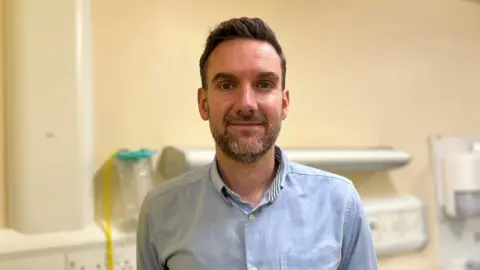 Sandwell and West Birmingham NHS Trust
Sandwell and West Birmingham NHS TrustThe state of end-of-life care needs needs to be “fixed” before considering legalising assisted dying, a palliative care specialist has said.
MPs across the country are set to vote on Friday whether to take a proposed bill to the next stage.
However, Dr Mike Blaber, a consultant in palliative care at Sandwell and West Birmingham NHS Trust, said end-of-life care needed “urgent attention”.
It comes as hospices have warned that the sector is facing a financial crisis, although the government has pledged support.
“[The bill] is not a case of expanding choice, because the choice of having excellent palliative care does not exist at the moment, that needs to be fixed before we do anything else,” Dr Blaber said.
The branch of medicine seeks to relieve pain and improve the quality of life for terminally ill patients and in the best examples can make a huge difference to their experience and that of their family.
 St Giles Hospice
St Giles HospiceDr Blaber is against moves to legalise assisted dying, and said, if a new law was passed, vulnerable patients without access to good quality palliative care could feel pressure to end their lives.
He said he encountered patients who did not want to be a “nuisance” and feared the legislation would add “subtle pressure” to those who felt palliative care was no longer an option.
Speaking to BBC Radio WM, he said the sector was “terribly underfunded”.
St Giles Hospice, in Lichfield, warned in the summer it was dealing with a £1.5m deficit.
Its CEO Elinor Eustace said sustainable funding was a “must” in order to accommodate everyone in need of end-of-life care.
She added that the parliamentary bill comes at a time when hospices are facing “an increasingly challenging period”.
Birmingham Hospice likewise announced in June that it was closing beds and cutting staff in the face of an estimated £2.4m budget shortfall, despite huge demand on its services.
‘Greater investment needed’
Many other hospices nationally are in the similar position.
Hospice UK, which represents the sector, has requested £110m in emergency funding.
“High quality end-of-life and palliative care is currently not available to everyone who needs it,” it said, adding that demand continued to grow.
The organisation has called on MPs to back “greater investment”.
Earlier this month, Health Secretary Wes Streeting told the BBC he would “make sure we’re protecting our hospices”, after concerns that the rise in National Insurance (NI) employer contributions, announced in the Budget, would negatively affect hospice finances and their ability to support people.
“Looking after the terminally ill is not a burden, it’s a privilege and that is what we should be concentrating on,” Dr Blaber said.











































